11 Best Herbal Tinctures For Asthma
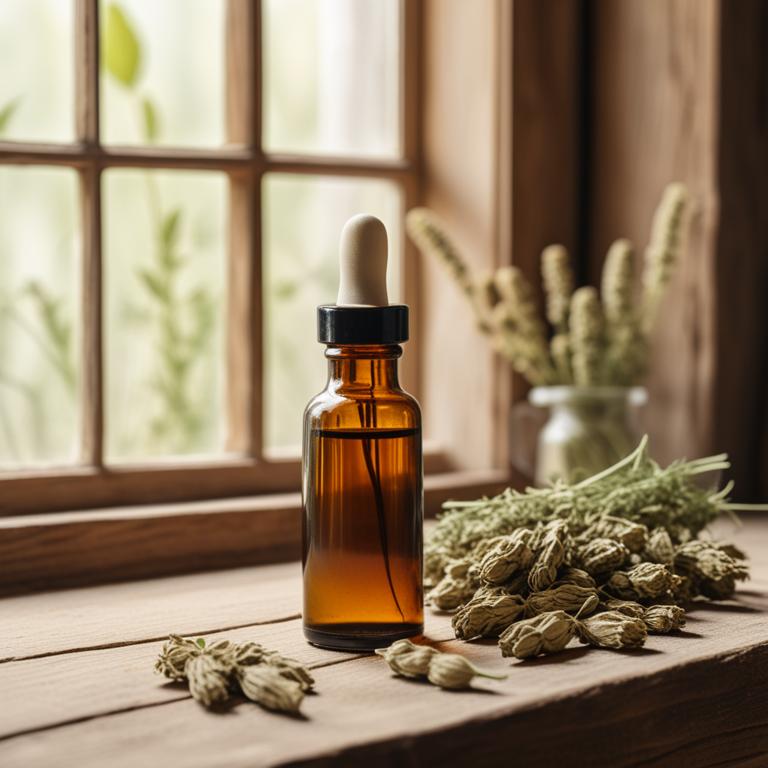
Herbal tinctures for Asthma are concentrated plant extracts used to alleviate symptoms of respiratory distress, such as wheezing and shortness of breath.
These natural remedies offer numerous benefits, including the ability to reduce inflammation, relax airways, and improve lung function.
Examples of herbal tinctures used to treat asthma include Peppermint, which helps to relax airways and ease congestion; Licorice root, which soothes and protects the mucous membranes; Eucalyptus, which helps to clear mucus and open airways; Thyme, which has antimicrobial properties to combat infections; and Ginger, which reduces inflammation and improves respiratory function.
By incorporating these herbal tinctures into their treatment plan, individuals with asthma may experience a reduction in symptoms and improved overall lung health.
According to The Journal of asthma : official journal of the Association for the Care of Asthma, tinctures for asthma have shown positive effects on bronchodilation, pulmonary function tests, and antagonism of asthma mediators such as histamine and platelet activating factor.
Below there's a list of the 11 best herbal tinctures for asthma.
- 1. Echinacea purpurea tinctures
- 2. Eucalyptus globulus tinctures
- 3. Curcuma longa tinctures
- 4. Pelargonium sidoides tinctures
- 5. Ginkgo biloba tinctures
- 6. Boswellia serrata tinctures
- 7. Zingiber officinale tinctures
- 8. Aspalathus linearis tinctures
- 9. Matricaria chamomilla tinctures
- 10. Foeniculum vulgare tinctures
- 11. Astragalus membranaceus tinctures
Also you may be interested in...
TODAY'S FREE BOUNDLE
Herb Drying Checklist + Herbal Tea Shopping List + Medicinal Herbs Flashcards
Enter you best email address below to receive this bundle (3 product valued $19.95) for FREE + exclusive access to The Aphotecary Letter.
$19.95 -> $0.00
1. Echinacea purpurea tinctures

Echinacea purpurea tinctures have been traditionally used to help alleviate symptoms associated with asthma, a chronic respiratory condition characterized by inflammation and airway constriction.
The anti-inflammatory and antispasmodic properties of Echinacea purpurea tinctures are believed to help reduce inflammation and calm the airways, making breathing easier for individuals with asthma.
The bioactive constituents of Echinacea purpurea, including alkylamides and caffeic acid derivatives, are thought to be responsible for its therapeutic effects in treating asthma by inhibiting the release of pro-inflammatory cytokines and reducing oxidative stress.
The benefits of using Echinacea purpurea tinctures to treat asthma include reduced reliance on pharmaceutical medications, improved lung function, and enhanced overall well-being.
Related Study
According to the study, Echinacea purpurea tinctures may have potential for adjuvant symptomatic therapy in respiratory conditions, such as asthma, due to the presence of bioactive compounds in the plant.
2. Eucalyptus globulus tinctures
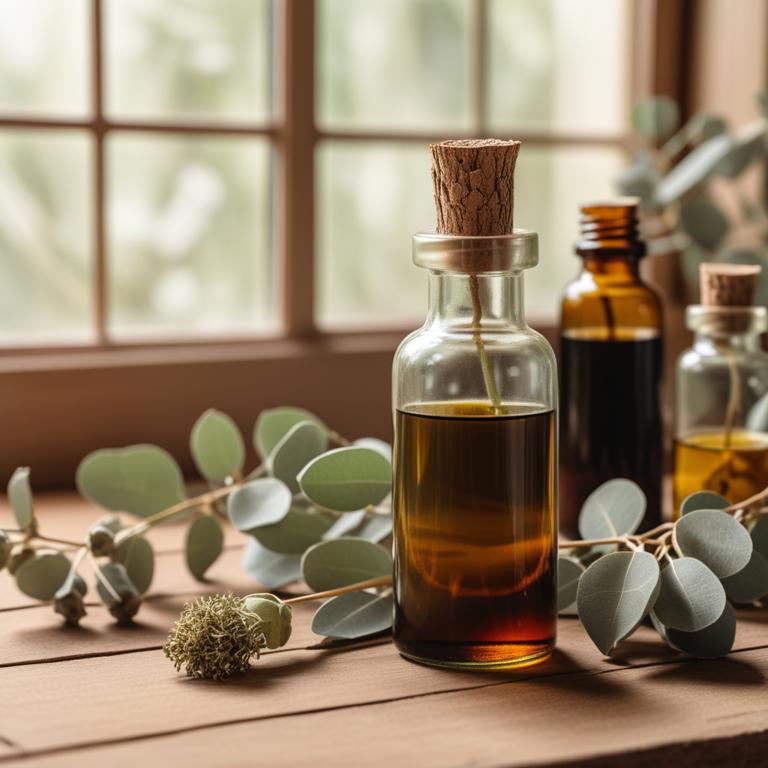
Eucalyptus globulus tinctures have been traditionally used to treat asthma, an inflammatory and respiratory condition.
The antispasmodic and expectorant properties of this herbal preparation help to relax bronchial muscles and clear mucus from the airways, making it easier to breathe.
The bioactive constituents, including eucalyptol, limonene, and alpha-pinene, have anti-inflammatory and bronchodilatory effects that help to reduce inflammation and improve lung function.
Regular use of Eucalyptus globulus tinctures may provide relief from asthma symptoms, such as wheezing, coughing, and shortness of breath, and also reduce the frequency and severity of asthma attacks.
Related Study
According to "African journal of traditional, complementary, and alternative medicines : AJTCAM", Eucalyptus globulus tinctures for asthma were found to be effective, as it was identified as one of the most important species used by traditional healers in Togo to treat asthma, based on calculated use values.
3. Curcuma longa tinctures

Curcuma longa tinctures have been used to treat asthma due to their anti-inflammatory and bronchodilatory properties, which help to reduce inflammation in the airways and improve breathing.
The bioactive constituents of Curcuma longa, including curcumin, demethoxycurcumin, and bisdemethoxycurcumin, have been found to inhibit the production of pro-inflammatory enzymes and cytokines that contribute to asthma symptoms.
By reducing inflammation and promoting relaxation of airway smooth muscles, Curcuma longa tinctures may help to alleviate asthma symptoms and improve lung function.
Regular use of Curcuma longa tinctures may also have long-term benefits in reducing the severity and frequency of asthma attacks.
Related Study
According to "International journal for vitamin and nutrition research. Internationale Zeitschrift fur Vitamin- und Ernahrungsforschung. Journal international de vitaminologie et de nutrition", Curcuma longa tinctures for asthma showed a preventive effect on tracheal responsiveness and lung pathological insults in sensitized rats, with tracheal responsiveness to methacholine decreased from 50 to 400% due to the extract treatment, and interstitial fibrosis significantly decreased compared to sensitized rats.
4. Pelargonium sidoides tinctures
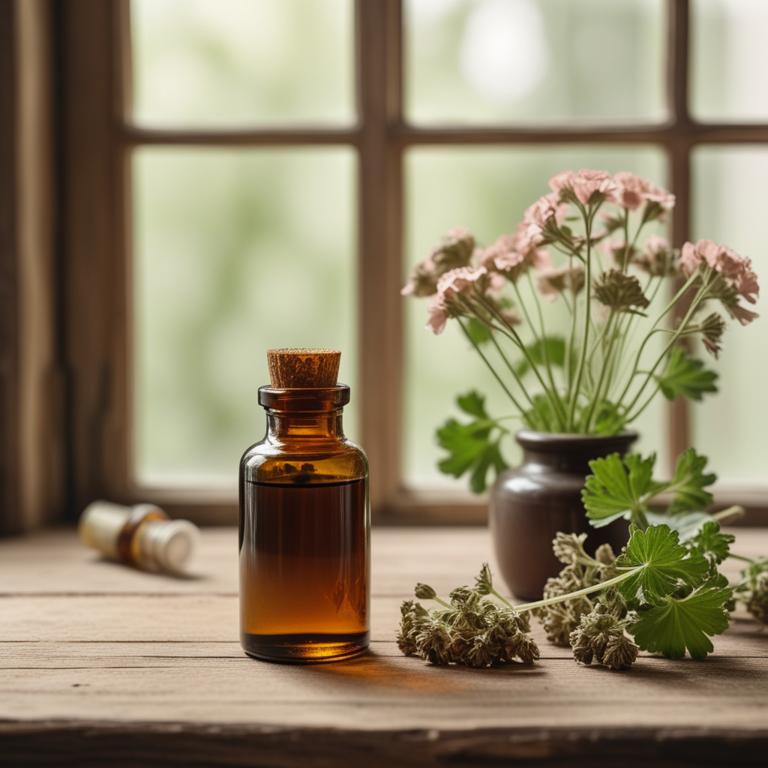
Pelargonium sidoides tinctures have been traditionally used to treat asthma due to their anti-inflammatory, antispasmodic, and expectorant properties.
These properties help to reduce inflammation in the airways, relax the bronchial muscles, and facilitate the removal of mucus, thereby alleviating asthma symptoms.
The bioactive constituents of Pelargonium sidoides, including flavonoids, phenolic acids, and terpenoids, contribute to its therapeutic effects.
The benefits of using Pelargonium sidoides tinctures to treat asthma include improved respiratory function, reduced frequency and severity of asthma attacks, and enhanced overall well-being.
5. Ginkgo biloba tinctures

Ginkgo biloba tinctures have been traditionally used to help alleviate symptoms of asthma due to their anti-inflammatory and bronchodilatory properties.
The bioactive constituents, including flavonoids and terpenoids, help to relax bronchial smooth muscles, reducing constriction and making it easier to breathe.
This herbal preparation also has antioxidant properties that help to reduce oxidative stress and inflammation in the airways, further contributing to its benefits in treating asthma.
The regular use of Ginkgo biloba tinctures may lead to improved lung function and reduced symptoms of asthma, offering a natural and complementary approach to traditional treatment options.
Related Study
According to "Zhongguo Zhong xi yi jie he za zhi Zhongguo Zhongxiyi jiehe zazhi = Chinese journal of integrated traditional and Western medicine", Ginkgo biloba tinctures significantly reduced airway hyperreactivity and improved clinical symptoms and pulmonary functions of asthma patients.
6. Boswellia serrata tinctures
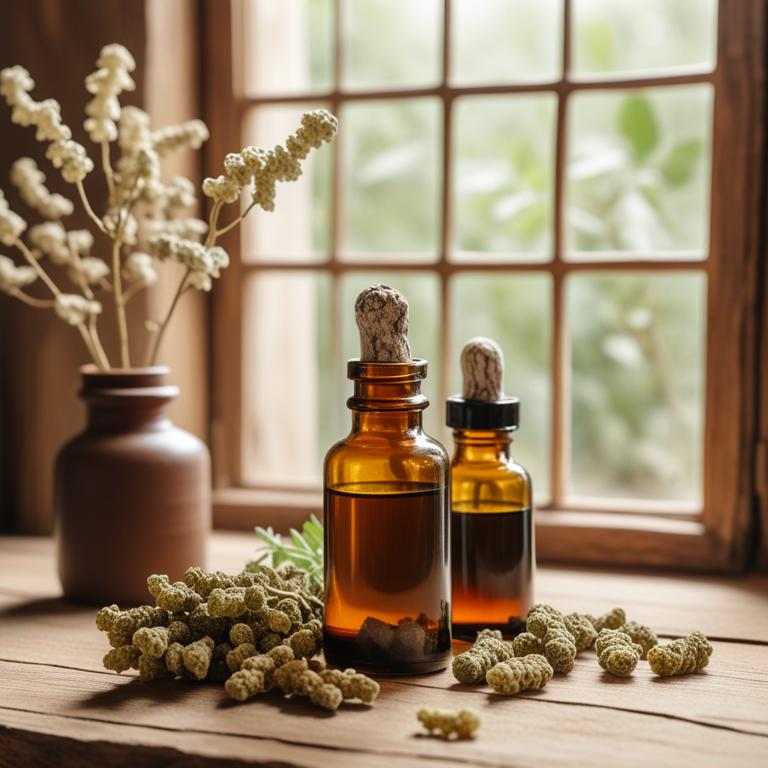
Boswellia serrata tinctures have been traditionally used to treat asthma due to their anti-inflammatory and bronchodilatory properties, which help to reduce inflammation and improve lung function.
The tinctures contain bioactive constituents such as boswellic acids, particularly acetyl-11-keto-beta-boswellic acid (AKBA), that have been shown to inhibit the production of pro-inflammatory enzymes and cytokines, thereby alleviating asthma symptoms.
By reducing inflammation and promoting relaxation of bronchial muscles, Boswellia serrata tinctures help to improve breathing and reduce the frequency and severity of asthma attacks.
The benefits of using Boswellia serrata tinctures to treat asthma include reduced reliance on conventional medications, improved quality of life, and a natural approach to managing symptoms and promoting overall respiratory health.
Related Study
According to "European journal of medical research", Boswellia serrata tinctures for asthma showed improvement in 70% of patients with symptoms and signs of bronchial asthma, including a decrease in eosinophilic count and ESR, in comparison to 27% in the control group.
7. Zingiber officinale tinctures

Zingiber officinale tinctures, derived from the rhizome of the ginger plant, have been traditionally used to treat asthma due to their anti-inflammatory properties, which help to reduce inflammation and ease breathing.
The bioactive constituents of this herbal preparation, including gingerol and shogaol, act as bronchodilators, helping to relax the airway muscles and improve airflow, making it easier to breathe.
The benefits of using Zingiber officinale tinctures to treat asthma include reduced frequency and severity of asthma attacks, improved lung function, and a decrease in the need for medication.
By reducing inflammation and opening airways, Zingiber officinale tinctures provide a natural and effective treatment option for individuals suffering from asthma.
Related Study
According to the study, Zingiber officinale tinctures for asthma show positive effects on bronchodilation, pulmonary function tests, and antagonism of asthma mediators, with some mechanisms of action explored, but the specific information about Zingiber officinale tinctures is not provided in the given study.
8. Aspalathus linearis tinctures

Aspalathus linearis tinctures, a traditional herbal remedy, have been used to treat asthma by exhibiting anti-inflammatory and bronchodilatory properties.
This herbal preparation helps to treat asthma by reducing inflammation in the airways, relaxing bronchial muscles, and improving lung function.
The bioactive constituents of Aspalathus linearis tinctures, including flavonoids and phenolic acids, play a crucial role in its therapeutic effects, helping to alleviate symptoms of asthma such as wheezing and shortness of breath.
Regular use of Aspalathus linearis tinctures has been found to provide relief from asthma symptoms, improve quality of life, and reduce the need for conventional medications.
9. Matricaria chamomilla tinctures
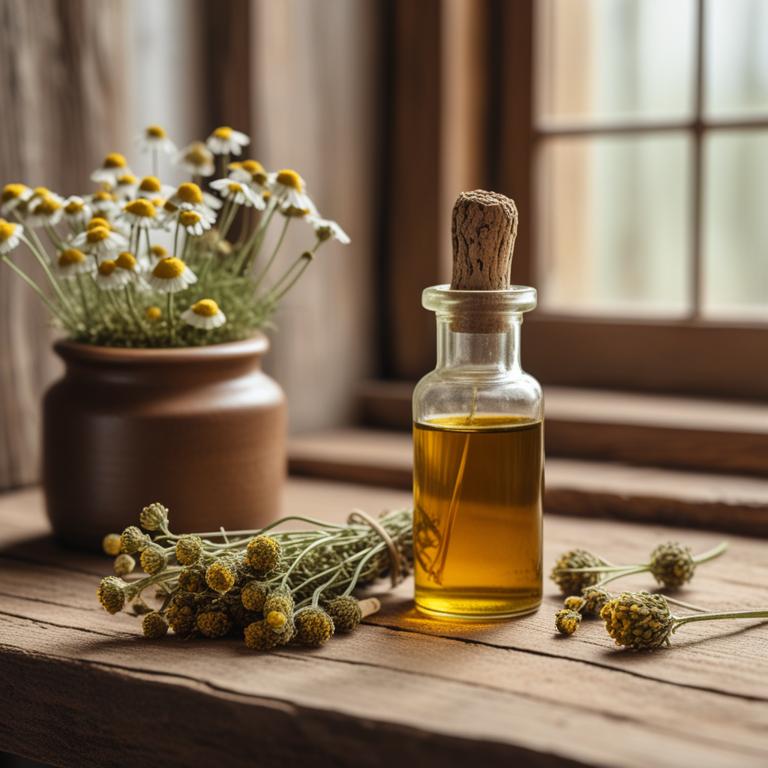
Matricaria chamomilla tinctures have been traditionally used to treat asthma due to their anti-inflammatory, antispasmodic, and bronchodilatory properties.
The bioactive constituents of Matricaria chamomilla, such as apigenin, luteolin, and matricine, are responsible for its therapeutic effects, which help to relax airway muscles, reduce inflammation, and improve breathing.
By using Matricaria chamomilla tinctures, individuals with asthma may experience relief from symptoms such as wheezing, shortness of breath, and chest tightness.
The benefits of using Matricaria chamomilla tinctures to treat asthma include reduced frequency and severity of asthma attacks, improved lung function, and enhanced overall quality of life.
Related Study
According to "Heliyon", Matricaria chamomilla tinctures for asthma may be beneficial due to their potential in vivo antioxidant and anti-inflammatory effects, which can help reduce inflammation and alleviate symptoms of asthma.
10. Foeniculum vulgare tinctures
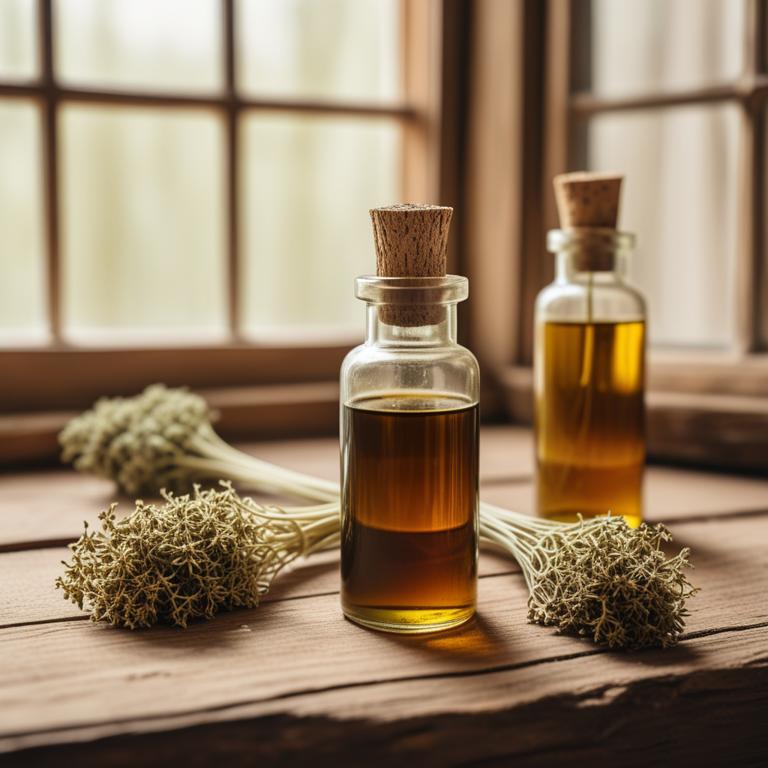
Foeniculum vulgare tinctures have been traditionally used to treat asthma due to their bronchodilatory and anti-inflammatory properties, which help to relax the airway muscles and reduce inflammation, thereby making it easier to breathe.
The bioactive constituents, including anethole and limonene, present in Foeniculum vulgare tinctures, are responsible for these effects, which in turn help to alleviate symptoms of asthma such as wheezing and shortness of breath.
The benefits of using Foeniculum vulgare tinctures to treat asthma include reduced reliance on medication, improved lung function, and enhanced overall quality of life.
Regular use of Foeniculum vulgare tinctures may also help to reduce the severity and frequency of asthma attacks.
Related Study
According to "The Journal of asthma : official journal of the Association for the Care of Asthma", Foeniculum vulgare tinctures, along with other Ayurvedic herbals, showed potential benefits in the treatment of asthma, although the study quality was mixed and more research is needed to establish their effectiveness and safety.
11. Astragalus membranaceus tinctures
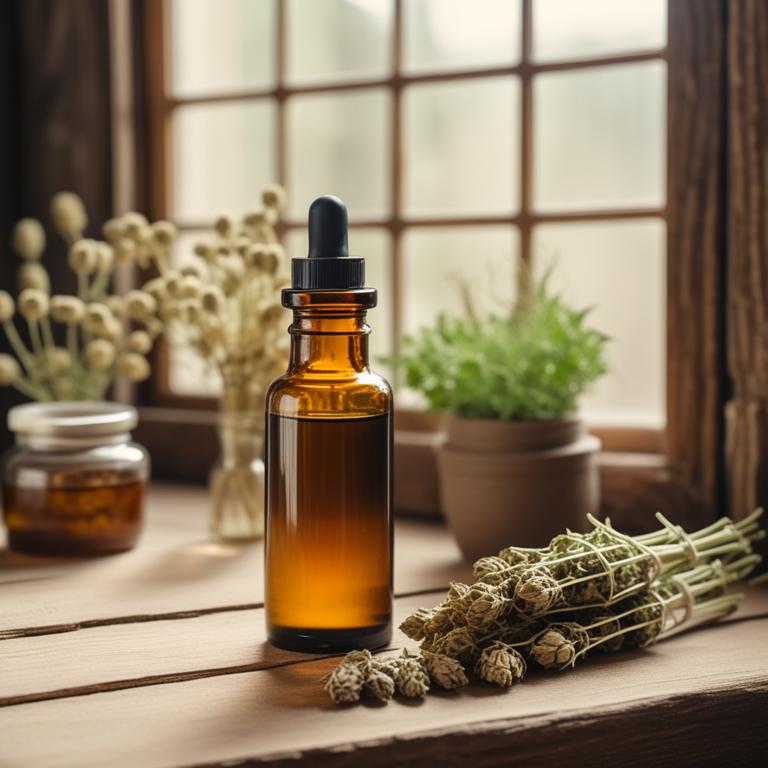
Astragalus membranaceus tinctures have been traditionally used to treat asthma due to their anti-inflammatory and immune-boosting properties.
The bioactive constituents present in Astragalus membranaceus, such as flavonoids, saponins, and polysaccharides, help to reduce inflammation in the airways and improve lung function, thereby alleviating asthma symptoms.
By modulating the immune system and reducing oxidative stress, Astragalus membranaceus tinctures can help to control asthma attacks and improve overall respiratory health.
The benefits of using Astragalus membranaceus tinctures to treat asthma include reduced reliance on medication, improved lung function, and enhanced overall well-being.
Related Study
According to "The Journal of asthma : official journal of the Association for the Care of Asthma", Astragalus membranaceus tinctures may have a positive effect on asthma symptoms, including bronchodilation, improved pulmonary function tests, and antagonism of asthma mediators such as histamine and platelet activating factor.